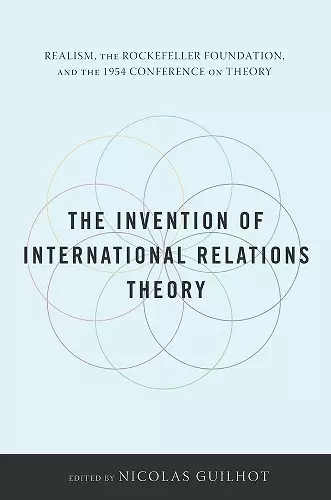The Invention of International Relations Theory
Realism, the Rockefeller Foundation, and the 1954 Conference on Theory
Format:Hardback
Publisher:Columbia University Press
Published:28th Jan '11
Currently unavailable, and unfortunately no date known when it will be back

Indispensable. While this volume will be widely read, cited, and assigned within the discipline, it will also be important in American and world intellectual history and in the critical history of ideas about world organization and world politics. -- Samuel Moyn, author of The Last Utopia: Human Rights in History An important contribution to an authentic understanding of the origins and evolution of the field of international relations as well as to the history of political science as a whole. It also represents a significant advance in the study of disciplinary and intellectual history. -- John G. Gunnell, State University of New York at Albany and University of California, Davis Fascinating insights. Scholars of all stripes should read this carefully. It will help them better understand how they think about the world and might even help them refine theories of how states interact with one another. -- John J. Mearsheimer, University of Chicago An outstanding collection by top-drawer scholars that adds enormously to a growing literature on the evolution of a much misunderstood academic field. What emerges is a story altogether more complex--and far more interesting--than we had been told about a subject whose history has been shrouded in myth, simplification, and plain misrepresentation. A volume that will surely redefine our understanding of the intellectual history of international relations theory, its relationship with power, and the central part played by such giants as Morgenthau, Nitze, Wolfers, Fox, and Niebuhr. -- Michael Cox, London School of Economics
The 1954 Conference on Theory, sponsored by the Rockefeller Foundation, featured a who's who of scholars and practitioners debating the foundations of international relations theory. Assembling his own team of experts, all of whom have struggled with this legacy, Nicolas Guilhot revisits a seminal event and its odd rejection of scientific rationalism. Far from being a spontaneous development, these essays argue, the emergence of a "realist" approach to international politics, later codified at the conference, was deliberately triggered by the Rockefeller Foundation. The organization was an early advocate of scholars who opposed the idea of a "science" of politics, pursuing, for the sake of disciplinary autonomy, a vision of politics as a prerational and existential dimension that could not be "solved" by scientific means. As a result, this nascent theory was more a rejection of behavioral social science than the birth of one of its specialized branches. The archived conversations reproduced here, along with unpublished papers by Hans Morgenthau, Reinhold Niebuhr, and Paul Nitze, speak to this defensive stance. International relations theory is critically linked to the context of postwar liberalism, and the contributors explore how these origins have played out in political thought and American foreign policy.
This work is a classic and will surely be required reading for doctoral qualifying exams and graduate-level international relations theory courses... Essential. Choice ...an intriguing book about an important, if slightly baffling, episode in the intellectual history of International Relations... -- Ian Hall International Affairs ...a text that will be indispensable for the training of graduate students in IR and in diplomatic history broadly defined. -- Volker Berghahn H-Diplo Roundtable
ISBN: 9780231152662
Dimensions: unknown
Weight: unknown
312 pages